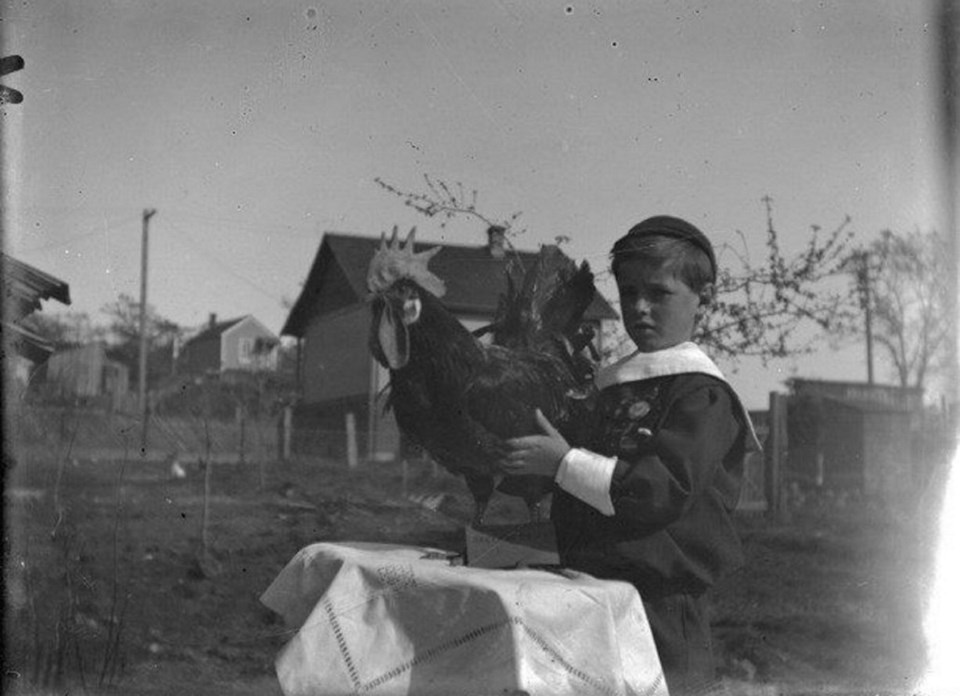Intriguing displays from the Saanich Archives have been showing up at the Cedar Hill Rec Centre and at the Saanich Municipal Hall. I decided to track them to the source.
The Saanich Archives are in the Centennial Library, located behind Tillicum Mall next to the G.R. Pearkes Arena. This airy and welcoming facility was purpose-built as part of Saanich’s centennial in 2007. I was met there by Kerri Ward, an articulate and enthusiastic archivist who was keen to show me some of the treasures.
At the front, the archive holds an extensive reference library of books, maps, newspapers and more. “Anything to do with Saanich,” Ward told me. And, because Saanich does not have a museum, they also have some artifacts. I saw a stoneware bed-warmer, an air-raid precaution kit, and an egg-weighing scale. “We’re not actively collecting 3-D objects,” Ward explained, “but there’s no way we are saying no to something really good.” Among the antiques, you’ll find computer terminals to access the extensive Saanich Archives website.
Behind the front desk, part-time professional archivist Sonia Nicholson was at work scanning photographs taken 100 years ago by Annie Girling, which are among the prizes of this collection. Girling was an English woman who settled with her family on a property on the north edge of what became the University of Victoria campus. Though she never exhibited her work, she was a dedicated amateur, keen to photograph all aspects of Saanich, the natural world, her family and friends. More than 1,000 fragile glass plate negatives were discovered by Lindsay Lambert, a professor, in the basement of the derelict Girling house just before it was demolished. He never saw prints from these negatives, but preserved them for more than 30 years. Then, in 2007, they were given a home by Saanich archivist Caroline Duncan. Now, day by day, images are being scanned and then posted online for your interest.
As we went further into the storage area, Ward pointed out the framed Roll of Honour, a handsome diploma on which are inscribed the names of 300 people from Saanich who served in the First World War. It was incomplete at the time it was framed. Currently, interested students and citizens, with help of the Commonwealth war graves records, make it the centre of a project titled Saanich Remembers. They identify people on the list, add those missing and correct inconsistencies. The Roll of Honour will be part of an exhibit at Cedar Hill opening in August to commemorate the beginning of the First World War.
Ward handed me a pair of white cotton gloves and we entered the climate-controlled vault where most of the files are kept. Of primary importance are all the municipal documents, kept since Saanich was incorporated in 1906: notes from every council meeting, the planning and engineering departments and much else. This takes up about half of the storage space. The rest contains collections from private citizens: donations of pioneer family papers, letters, poems, photos, art works and so on.
Knowing of my interest in documentary painting, Ward laid out two three-part panoramic paintings created by Harry Bunker about 1955 and 1965. Bunker was an amateur artist who painted the view from his back window, looking over the area south of Royal Oak. These paintings are the work of an inspired amateur, and make a fascinating record of our recent urban transformation.
The largest donation in this Saanich horde is from the Goward Family. Owen and Elizabeth Goward lived in a lovely home on Arbutus Road which subsequently become a beloved community centre. Elizabeth specialized in portraits. Owen was a commercial artist who created posters and menus for the Princess ships which plied the West Coast. “We still have all this stuff,” Ward offered enthusiastically, opening file boxes almost at random. “Linocut plates, greeting cards, a lot of pictures of the ocean and sailboats, sketchbooks, watercolours.” This has been very useful to create exhibits on this year’s theme, “heritage afloat.”
“The Goward collection — it’s huge,” Ward went on, “because they didn’t move and get rid of things.” We burrowed further into that family’s past, opening big albums of original photographs from 1880s. These were souvenirs of a “grand tour” of Paris, Venice and Egypt, taken by Owen’s parents. And we speculated about their collection of large photos of a British royal funeral. Was it Queen Victoria’s? The Saanich Archives are set up to pique your curiosity and the archivists are always at work, enticing people to discover this collection.
“We want them to know that it’s not just an old stuffy dry place,” she said. They have created kits for schools (and home schoolers), providing them with period newspapers, photographs, documents — and magnifying glasses, too.
The archives hosted a “pro-D day” for UVic student teachers to introduce them to the use of primary materials in their class work. Ward seemed surprised to learn that most of the university students had never been to archives. But that doesn’t surprise me. For most people, archives are foreign territory, hidden behind elaborate procedures, where arcane artifacts are stored away and handled with care. But in Saanich, the archivists are available to navigate the collections for you, and now many of their things are digitized, and available from home.
While online references are wonderful, I sensed that Ward and I share a propensity to rummage around in the communal “attic,” to touch the past in a tangible way. Saanich is just one among many local archives that would be pleased to have you visit. Be brave. Any pretext that leads you to the archives’ front desk is sufficient. You’ll be graciously received, and when you begin looking, you just never know what you’ll find.
��
Saanich Municipal Archives, Tillicum Road, phone 250-475-1775 ext. 3479, saanicharchives.ca.



